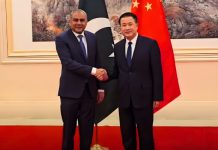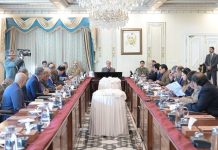-DG ISPR emphasizes on regional peace & stability
-Highlights importance of Raddul Fasaad
-States Operation was aimed to ensure a peaceful & stable Pakistan
-Rejects speculations on appointment of new ISI Chief
-Claims Army nothing without masses
RAWALPINDI: Inter-Services Public Relations (ISPR) Director-General (DG) Major General Babar Iftikhar on Monday said that peace and stability in Afghanistan is crucial for the whole region and Pakistan continues to play active role as peace facilitator for regional stability and prosperity.
He also explained the importance of Operation Raddul Fasaad, wherein the civil law enforcement agencies and society as a whole have a pivotal role to play in the fight against terrorism.
During a press conference at the General Headquarters in Rawalpindi, the ISPR DG shared the details about the dividends earned through the operation that was launched on February 22, 2017, by the army under Chief of Army Staff (COAS) General Qamar Javed Bajwa. He said that the strategic intent of Operation Raddul Fasaad was to ensure a peaceful and stable Pakistan. Maj Gen Iftikhar said the armed forces and the masses have been successfully facing national security challenges and will continue to tackle them as a nation in the days to come. He maintained that “every Pakistani is a sepoy of Raddul Fasaad”. He further explained: “While armed forces fight terrorists, terrorism and extremism can only be defeated by the civil law enforcement agencies and society as a whole.” Major General Babar Iftikhar said a total of 375,000 intelligence-based operations were carried out across the country since the start of the operation in 2017. He said the state writ was restored over 7500 square kilometres through this operation.
“Operation Raddul Fasaad was launched with a two-pronged strategy involving the counter-terrorism and counter-extremism domain,” he added, wherein one prong focused on counter-terrorism and the other focused on violent extremism. The ISPR DG said 353 terrorists were killed and hundreds of others were arrested during the operation. He stressed most of the over 5000 threat alerts were neutralized before their materialization during the last four years. He said over 72,000 illegal weapons and five million ammunition were recovered. He said 497 border posts were set up. He said demining was also carried out in tribal districts.
Under capacity enhancement of law enforcement agencies, Major General Babar Iftikhar said 58 new wings of FC were raised and 15 others will be established. He said police and Levies personnel were also trained. He said 96 per cent of temporarily displaced persons have returned to their homes. The DG ISPR said several steps were taken under the National Action Plan, including the setting up of military courts. He said 717 cases were referred to the military courts. He said 344 terrorists were awarded death sentence in these cases, and 58 of them were implemented. He said 106 other terrorists were given life imprisonment. Major General Babar Iftikkar said over 1200 sub-nationalists have laid down their arms before security forces. He said the spread of hate-speech was also controlled considerably.
He said the initiative of Paigham-e-Pakistan has considerably helped control extremism in the country, and the religious scholars have played an important role in this regard. He said under de-radicalization, over 5,000 people have been reintegrated into society. Operation Raddul Fasaad has contributed a lot to improve the law and order situation in Karachi as well, he maintained. He said the city’s position on Crime Index has dropped from sixth in 2014 to 106 today. He said socio-economic dividends of the operation have been witnessed in the tribal districts of Khyber Pakhtunkhwa (KP).
“In these four years, more than 5,000 threat alerts were issued and the majority of them were neutralised before they materialised. During Raddul Fasaad, the Khyber-IV operation was also carried out, which was aimed at clearing the Rajgal valley and making the Afghan border safe,” he stressed on the occasion. He said 831 development projects worth over Rs31 billion are being carried out there. He said several development projects are also being implemented in Balochistan. He added sports activities have also been restored across the country. The DG ISPR said 23rd March will be celebrated with zeal and zest. He said a national parade will be organized on the day to disseminate the message of “one nation, one destination (Aik quom aik Manzil) “.
To a question, he said the country’s peace is directly linked with peace in Afghanistan. He said Pakistan wishes to see peace beyond borders especially in Afghanistan. He said we will continue our support in this regard. He added that Pakistan’s “grand strategy” in its war against terrorism was based on four concepts: “Clear, hold, build and transfer.”
“One thing is clear that an ideology can be countered can only be countered by a superior ideology or superior argument as we say.”
The DG ISPR said our enemy is engaged in a massive campaign of fifth-generation warfare’ to obstruct Pakistan’s road to prosperity. Expressing satisfaction over the governmental measure to deal with new hybrid warfare, he called for national unity and cohesion in defeating the enemy’s designs in this regard.
Moreover, a lot of progress was also made under Raddul Fasaad regarding de-weaponisation and explosives control, the DG ISPR said, while adding that more than 72,000 foreign weapons and more than five million rounds of ammunition were seized from across the country. Detailing the security situation over the last few years, he said about 1,850 incidents of terrorism took place from 2017-2021, while 1,684 cross-border firing incidents took place on the Pak-Afghan border. During this period, 353 terrorists were killed and several were arrested as part of Raddul Fasaad, he told the presser.
“A lot of attention was given to capacity enhancement [of LEAs] from 2017-21; 58 new wings of FC have been established and 15 are yet to be set up. Work on the Pak-Afghan border fencing is 84 per cent complete, while on the Pak-Iran border more than 43pc work has been done. Additionally, 497 border posts and terminals have been built,” he said, adding that an integrated transit trade management system was being installed at Torkham and Chaman borders which would be operational in about two years.
In the tribal districts, Maj Gen Iftikhar said, around 72pc of the area has been cleared in demining efforts. “It was a very painstaking and slow process and two of our soldiers have been martyred during it, while 119 have been injured,” he added, revealing that more than 48,000 mines had been recovered during the operation so far. He further said the checkposts built at the start of military operations were being reduced after their conclusion as the situation moved towards normalisation. “In these four years, security forces have trained more than 37,428 policemen across the country and in the next six months about 4,000 more will be inducted in tribal areas’ police force after training. In Balochistan, the Pakistan Army has trained 3,865 Levies personnel and this year more than 3,500 Levies officials’ training is underway,” the DG ISPR said. He added that nearly 96pc of the people in Temporarily Displaced Persons camps had returned home as a result of a well-rounded strategy.
Outlining the steps taken to curb extremism and terrorism under NAP, he said 717 cases were referred to military courts which were established to punish terrorists. As many as 344 terrorists were awarded death sentences out of which the sentences of 58 convicts have been carried out, while 106 were sentenced to life in prison and 195 terrorists were awarded imprisonment of different terms. Five suspects were acquitted. Maj Gen Iftikhar said action had been taken against more than 78 terrorist outfits and active militants, the assets of terrorists were frozen and their activity was limited, and money laundering, extortion, and kidnapping for ransom were controlled through an effective strategy. Speaking about the positive effects of the counter violent extremism strategy, he said more than 1,200 sub-nationalist extremists had laid down their weapons and committed themselves to peace from 2017 till date. “Along with restricting hate speech and extremist material, terrorists’ narrative and its propagation were made ineffective effectively. With consultation from the Wafaqul Madaris and ulema, more than 1800 religious leaders united for the first time to present an effective narrative against extremism.
“Paigham-i-Pakistan has actually saved youth from going towards terrorism in the name of Islam and has helped curbed sectarianism and to a large extent defeated extremist narrative. In Gilgit-Baltistan and Balochistan, hostile intelligence agencies’ plan to mislead our youth against Pakistan was foiled,” he added. As part of Raddul Fasaad, the DG ISPR said, Pakistan also dismantled conspiracies by hostile intelligence agencies, especially through presenting “irrefutable evidence” of their aid and training to terrorists in front of the world. It is also a result of the operation that the law and order situation in Karachi has improved greatly, while development projects have been launched in KP as well as Balochistan, apart from the China-Pakistan Economic Corridor, Maj Gen Iftikhar noted.
“The path from terrorism to tourism was very tough and tiring,” he said, adding that the areas that were once a target of terrorism had economic activity now. “We have come a long way but I must say that we have a lot of ground to be covered. We can only cover it by remaining united.” The DG ISPR said Pakistan was adapting to the changing environment and “work is being done on the new challenges that come in the domain of hybrid war and fifth-generation warfare.” He announced that a parade will be held next month on the occasion of Pakistan Day in which the Pakistan Army will participate. Answering a question, Maj Gen Iftikhar said the international community had responded “very positively” to the dossier made public by Islamabad of Indian sponsorship of terrorism in Pakistan and that “it has been taken seriously at every forum.” He noted that many international organisations had lately issued statements and documents that proved that the dossier was being taken seriously.
Asked about the Financial Action Task Force (FATF) plenary beginning today in which a decision about keeping or removing Pakistan from its ‘grey list’ will be taken, the DG ISPR said the watchdog worked according to a procedure. He said Pakistan had done a lot of work to meet the FATF recommendations and its progress was acknowledged at every forum.
“Acknowledgement of progress is there on every forum, and will be on this forum as well. There is lobbying as well; every time we go a lobby starts working against us,” he added. On the Afghan peace talks, the ISPR chief said the process was moving forward in a positive direction. “So far I think everyone is listening to everyone and it’s progressing in a positive direction. Yes there are hurdles in between but those hurdles have been overcome before and I am sure they will be overcome in times to come,” he emphasised. He said Pakistan had “no favourites” in the peace process. “Our only interest in the Afghan peace process is peace in Afghanistan because peace in Pakistan is absolutely connected to peace in Afghanistan,” he added.–ISPR




